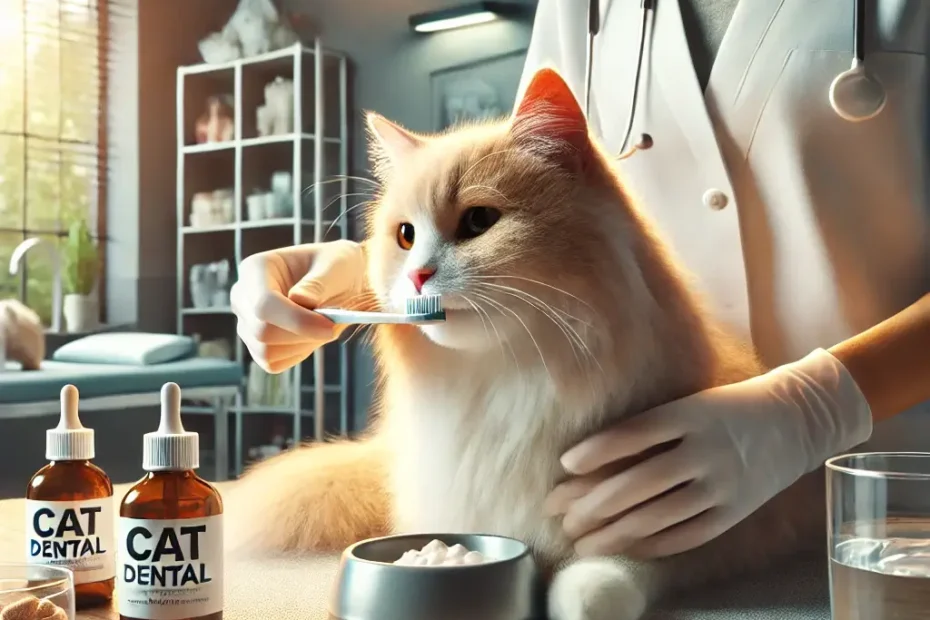Keeping your cat’s teeth healthy is as important as taking care of your own. Poor cat dental care can lead to issues like tooth decay, gum disease, and foul breath.
Over time, these problems can cause pain and harm your cat’s health. They may also make it difficult for your cat to eat.
Cats can’t brush their own teeth, so it’s up to you to help. Brush your cat’s teeth. Use VOHC-approved products. Get professional cleanings. They are essential for your cat’s oral health. You don’t have to complicate dental care. With the right tools and tips, you can make it part of your routine.
Also Read
This guide covers all you need to know about cat dental care. It includes at-home cleaning tips and advice on the best products. You’ll also learn how to spot early signs of dental problems and what to do after dental surgery. Let’s explore how you can help your feline friend have a happier, healthier life.
Understanding Cat Dental Health
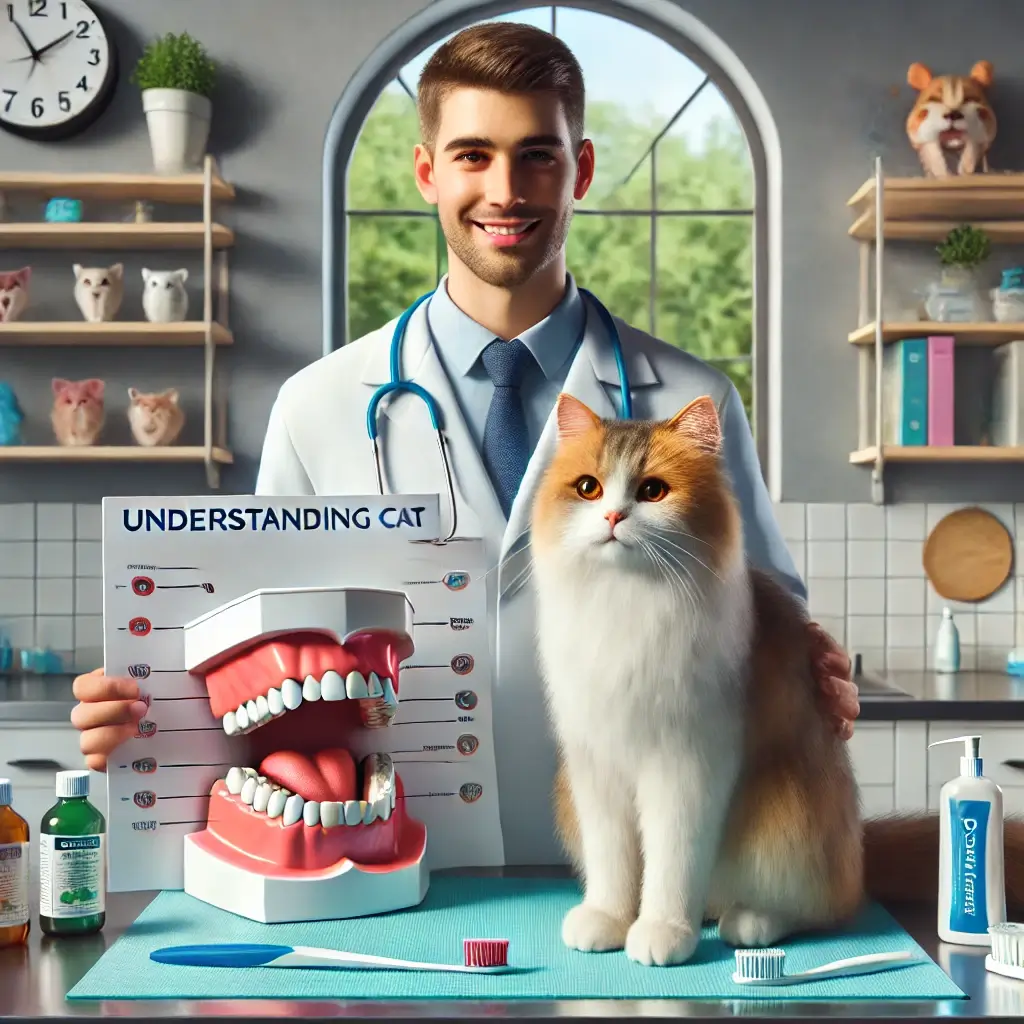
Cats rely on their teeth not only for eating but also for grooming and playing. Maintaining excellent oral health is essential to their well-being. Without proper cat dental care, plaque, gum disease, and tooth loss can develop.
1. Common Dental Issues in Cats
Periodontal Disease
- Periodontal disease is the most common dental issue in cats. Plaque and tartar buildup cause it.
- It starts with gum inflammation (gingivitis). If untreated, it can cause bone loss.
Symptoms to Watch For:
- Red or swollen gums.
- Bad breath.
- Eating or pawing at the mouth becomes challenging.
Tooth Resorption
- This painful condition involves the breakdown of the tooth’s structure.
- It often requires extraction, as it cannot be reversed.
Stomatitis
- Stomatitis is an inflammatory condition affecting the soft tissues in a cat’s mouth.
- Eating can be extremely painful and requires veterinary intervention.
2. Signs Your Cat Needs Dental Attention
Cats often hide their pain. So, watch for subtle signs of dental issues.
- Behavioral Changes: Reluctance to eat dry food, chewing on one side, or avoiding food altogether.
- Physical Symptoms: Drooling, bleeding gums, or bad breath.
Quick Tip: Regularly check your cat’s mouth for redness, swelling, or tartar buildup.
3. The Importance of Regular Check-Ups
Professional Cleanings:
- Vets perform deep cleanings under anesthesia to remove tartar. They also examine the teeth.
- These cleanings can prevent periodontal disease and identify hidden issues like fractured teeth.
Frequency of Dental Visits:
- Veterinarians recommend annual dental exams for most cats.
- Senior cats or those with existing dental problems may need more frequent visits.
Affiliate Link for Dental Tools:
- Explore VOHC-approved products for cats on Amazon.
4. Preventive Measures for Cat Dental Health
Daily Brushing:
- Brushing your cat’s teeth is the most effective way to prevent plaque buildup.
- Use a cat-specific toothbrush and pet-safe toothpaste.
Dental Treats and Chew Toys:
- Look for toys and treats with dental health labels.
- These products can help reduce tartar while giving your cat something enjoyable.
Affiliate Link for Dental Products:
- Find cat dental care products at AliExpress.
5. The Long-Term Impact of Good Dental Care
Good oral health for your cat prevents pain and supports their well-being. Poor dental hygiene can let bacteria into the bloodstream. They can harm vital organs like the heart and kidneys.
External Link for Expert Advice:
- Learn more about cat dental health at PetMD.
The Importance of Regular Dental Check-Ups for Cats
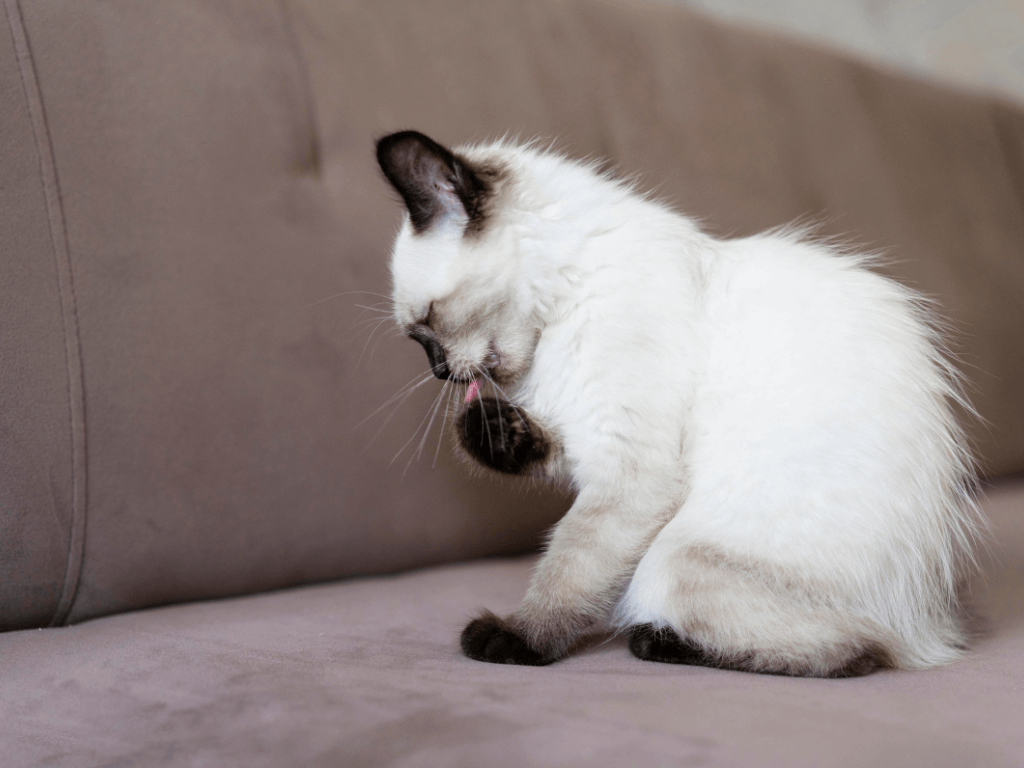
Cats excel at hiding discomfort. So, dental issues can go unnoticed until they are severe. Regular vet check-ups are essential for your cat’s health. They catch problems early.
1. Why Are Regular Check-Ups Necessary?
Early Detection of Dental Issues
- Dental diseases, like periodontal disease and tooth resorption, often show subtle signs in their early stages.
- Regular check-ups let vets find problems before they cause pain or require costly treatments.
Preventive Care
- Professional dental cleanings remove plaque and tartar that daily brushing may miss.
- These cleanings can prevent the progression of gingivitis to a more severe periodontal disease.
2. What Happens During a Veterinary Dental Check-Up?
Comprehensive Oral Exam
- The vet examines your cat’s teeth, gums, and oral cavity for signs of disease, damage, or abnormalities.
- You can take X-rays to find issues below the gum line, like fractures or root infections.
Professional Cleaning
- Cleaning includes scaling to remove tartar and polishing. This smooths the tooth surface, making it harder for bacteria to cling.
- We perform this process under anesthesia to ensure your cat’s comfort and safety.
Affiliate Link for At-Home Maintenance Tools:
- Complement professional cleanings with VOHC-approved dental products from Amazon.
3. How Often Should Cats Have Dental Check-Ups?
Annual Exams for Most Cats
- The standard recommendation for dental check-ups is once a year.
- For cats with known dental issues or senior cats, biannual visits may be necessary.
Signs Your Cat Needs an Immediate Visit:
- They exhibit behaviors such as drooling, pawing at the mouth, or refusing food.
- There may be visible tartar buildup, red gums, or bad breath.
Quick Tip: Schedule dental exams during your cat’s regular wellness visits for convenience.
4. Benefits of Regular Check-Ups
Improved Oral Health
- Preventative care helps avoid painful conditions and tooth loss.
- A healthy mouth supports easier eating and overall comfort.
Better Overall Health
- Untreated dental issues can cause infections in organs, like the heart and kidneys.
- Regular care reduces the risk of complications. It ensures a longer, healthier life for your pet.
5. The Cost of Neglecting Dental Care
Skipping dental check-ups can lead to costly procedures. These include tooth extractions and treatment for advanced gum disease. Preventive care is far more affordable and less stressful for your cat.
Affiliate Link for Cost-Effective Care Products:
- Get discounts on essential dental care items at AliExpress.
External Link for More Information
For expert advice on feline dental health, visit PetMD.
At-Home Dental Care Practices for Cats
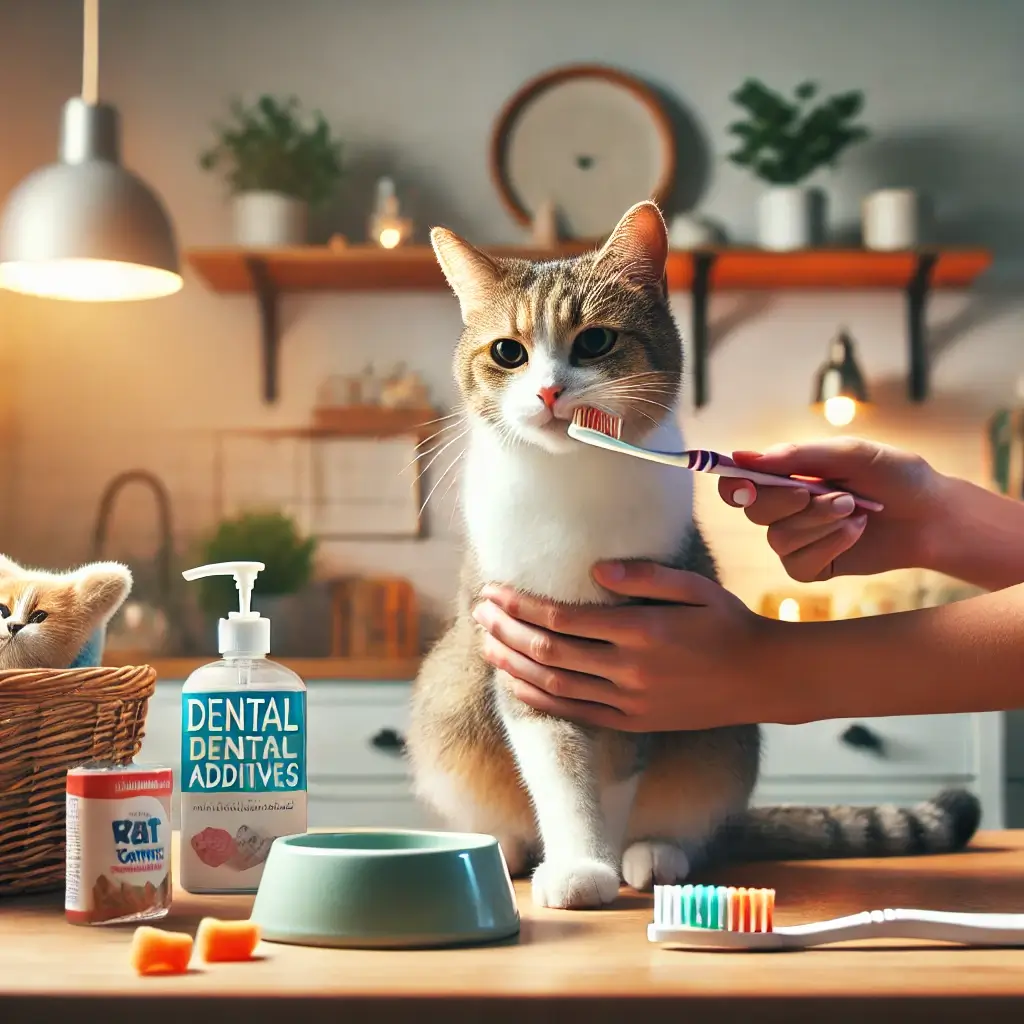
Maintaining your cat’s oral health at home is an essential part of their well-being. At-home dental care prevents plaque, gum disease, and pain. It keeps your cat healthy and happy.
1. Brushing Your Cat’s Teeth
Why Brushing is Crucial
- Brushing is the most effective way to remove plaque and prevent tartar buildup.
- It reduces the risk of developing severe dental issues like periodontal disease.
How to Brush Your Cat’s Teeth
- Use a toothbrush designed for cats or a finger brush for easier handling.
- Apply pet-safe toothpaste, as human toothpaste contains harmful ingredients like fluoride.
- Start slowly. Before using the brush, allow your cat to acclimate to the taste of the toothpaste.
Quick Tip: Reward your cat with treats or praise after brushing to create positive associations.
Affiliate Link for Brushing Supplies:
- Shop cat toothbrush and toothpaste sets on Amazon.
2. Using Dental Treats and Chew Toys
Benefits of Dental Treats
- Dental treats are a simple way to reduce plaque and freshen breath.
- Look for VOHC-approved products for cats to ensure effectiveness.
Chew Toys for Dental Health
- Chewing on toys helps scrape plaque off your cat’s teeth naturally.
- Choose toys made from safe, durable materials to avoid choking hazards.
Affiliate Link for Dental Treats and Toys:
- Explore effective options at AliExpress.
3. Incorporating Dental Diets
Specially Formulated Cat Food
- Some cat foods reduce tartar to promote oral health.
- These foods have unique textures that clean your cat’s teeth as they chew.
Hydration and Oral Health
- Encourage your cat to drink plenty of water to support saliva production.
- Saliva naturally washes away food particles and bacteria.
Quick Tip: Consider adding a pet water fountain to encourage more drinking.
4. Regular Oral Inspections
What to Look For:
- Check for signs like redness, swelling, or yellowing of teeth.
- Monitor for foul breath, which may indicate underlying dental issues.
How to Perform an Inspection:
- Gently lift your cat’s lip to examine their teeth and gums.
- Look for anything unusual, like broken teeth or bleeding gums.
5. Benefits of Consistent At-Home Care
Healthier Teeth and Gums:
- Regular care minimizes the need for professional cleanings.
- Preventing plaque buildup reduces the risk of pain and infections.
Improved Overall Well-Being:
- Good oral hygiene helps your cat eat comfortably and maintain a healthy weight.
- Reducing oral bacteria lowers the risk of systemic health problems.
Affiliate Link for Comprehensive At-Home Tools:
- Browse all-in-one dental care kits at AppSumo.
External Resource for Guidance
For more tips on at-home dental care, visit PetMD.
Dietary Considerations for Dental Health in Cats
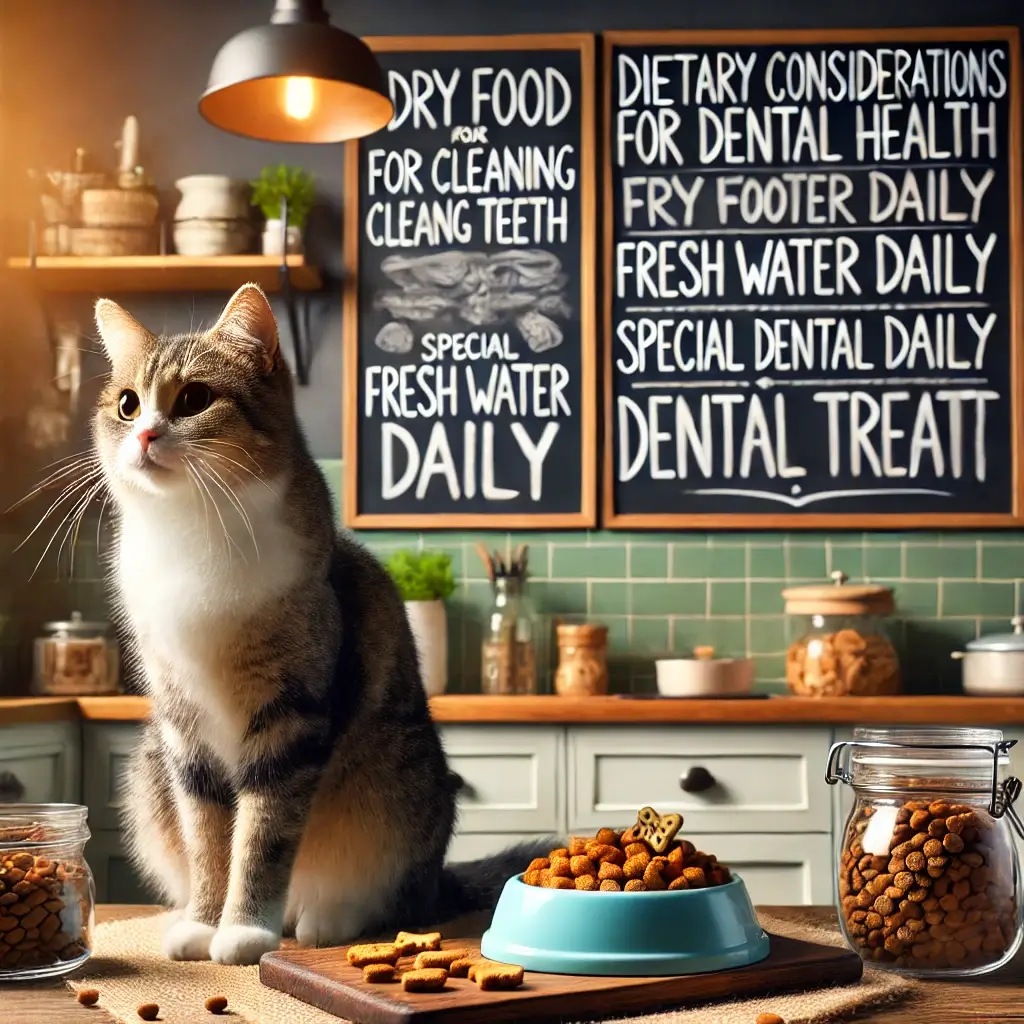
Your cat’s diet plays a crucial role in maintaining their oral health. The right foods and supplements can help. They can reduce plaque, prevent gum disease, and support dental hygiene.
1. The Role of Diet in Dental Health
Texture Matters
- Dry cat food’s crunchy kibbles help remove plaque from your cat’s teeth as they chew.
- However, not all dry foods are the same. Look for options specifically formulated for dental care for cats.
Nutritional Balance
- A nutritious diet supports the immune system. It helps fight gum inflammation and oral infections.
- Omega-3 fatty acids and vitamins C and E are essential. They reduce inflammation and promote gum health.
Affiliate Link for Dental Diets: Cat Dental Care.
- Shop VOHC-approved dental diets on Amazon.
2. Specially Formulated Dental Foods
How They Work:
- Dental-specific foods have unique kibble shapes and textures. They clean teeth better than regular kibble.
- Additionally, we fortify these diets with ingredients that help reduce plaque formation.
Examples of Effective Dental Foods:
- Hill’s Science Diet Oral Care.
- Royal Canin Dental Diet.
Quick Tip: Always consult your vet before switching to a specialized diet.
3. Wet Food vs. Dry Food
Advantages of Dry Food
- Dry food helps mechanically remove plaque as your cat chews.
- It is easier to store and less likely to spoil.
Benefits of Wet Food
- Wet food provides hydration, which is essential for saliva production and oral health.
- Cats with dental issues or missing teeth may find wet food easier to eat.
Balanced Approach: Combining wet and dry food can offer the best of both worlds for your cat’s dental and overall health.
4. Hydration and Oral Health
Why Hydration Matters:
- Proper hydration promotes saliva production, which naturally cleanses the mouth and reduces bacteria.
- Dehydration can lead to a dry mouth, which increases the risk of plaque and tartar buildup.
Encouraging Water Intake:
- Use a water fountain to make drinking more appealing for your cat.
- Add wet or water-rich foods to their diets for additional hydration.
Affiliate Link for Water Fountains:
- Find pet-friendly water fountains at AliExpress.
5. Supplements for Dental Health
Common Supplements Include:
- Enzymatic Powders: Sprinkle on your cat’s food to help break down plaque.
- Omega-3 Fatty Acids: Reduce inflammation and support healthy gums.
How to Use Supplements Safely:
- Follow the recommended dosage. Consult your vet to ensure it’s compatible with your cat’s diet.
Affiliate Link for Supplements: Cat Dental Care.
- Explore effective dental supplements at AppSumo.
6. Benefits of a Dental-Friendly Diet
Improved Oral Hygiene:
- Specialized diets reduce the need for frequent professional cleanings.
- A healthy diet minimizes plaque and tartar buildup.
Overall Health Benefits:
- Proper nutrition supports the immune system, helping your cat fight off infections.
- A balanced diet contributes to better digestion, shiny coats, and healthy energy levels.
External Resource
For more guidance on feline dietary needs, visit PetMD.
Preventive Measures for Cat Dental Care
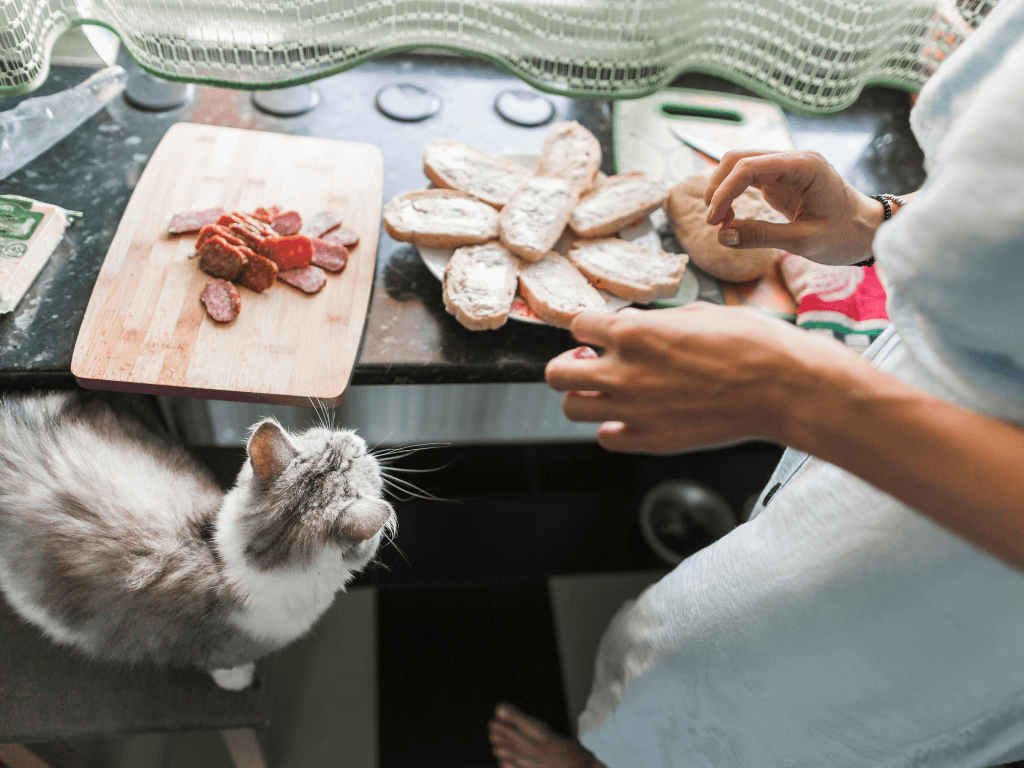
Prevention is the best way to protect your cat from dental diseases. Regular and practical measures can maintain the health of your cat’s teeth and gums for many years.
1. Establishing a Dental Care Routine
Daily Brushing
- Brushing your cat’s teeth daily is the most effective preventive measure.
- Use a soft-bristled toothbrush for cats and pet-safe toothpaste. Avoid harmful ingredients like fluoride.
How to Start Brushing:
- Gradually introduce brushing by letting your cat sniff and taste the toothpaste.
- Begin with short sessions, focusing on one or two teeth at a time.
Regular Oral Inspections
- Check your cat’s teeth and gums weekly for signs of redness, swelling, or tartar buildup.
- Early detection of issues like gingivitis can prevent more severe problems later.
Affiliate Link for Brushing Tools: Cat Dental Care.
- Shop cat toothbrush kits at Amazon.
2. Providing Dental Treats and Chew Toys
Why They Work
- Dental treats and chew toys help mechanically remove plaque and tartar.
- Chewing stimulates saliva production, which naturally cleans the mouth.
How to Choose the Right Products
- Look for VOHC-approved products for cats to ensure they are safe and effective.
- Avoid hard chews that could damage your cat’s teeth.
Affiliate Link for Dental Chews:
- Find effective dental treats at AliExpress.
3. Ensure proper nutrition.
Dental-Specific Diets
- Feed your cat dental health food, which helps remove plaque from their teeth.
- Consider a mix of wet and dry food to balance hydration and cleaning benefits.
Supplements for Dental Health
- Add enzymatic powders or dental rinses to your cat’s diet for extra plaque protection.
- Omega-3 supplements can reduce gum inflammation.
Affiliate Link for Dental Supplements:
- Explore supplements for cats on AppSumo.
4. Using Water Additives
How Water Additives Help
- Water additives fight bacteria, freshen breath, and reduce plaque.
- They are simple to use and require no additional effort once added to your cat’s water bowl.
Choosing the Right Additive
- Ensure the additive is vet-approved and free of harmful chemicals.
Quick Tip: Replace water daily to keep it fresh and effective for dental hygiene.
5. Professional cleanings.
Why They’re Essential
- Anesthesia allows vets to clean below the gum line, where brushing can’t reach.
- Regular cleanings prevent the progression of dental diseases like periodontal disease.
How Often to Schedule Cleanings
- Annual cleanings are recommended for most cats.
- Cats with existing dental problems may need biannual cleanings.
External Link for Professional Guidance:
- Learn more about professional cleanings at PetMD.
6. Benefits of Preventive Dental Care
Reduced Risk of Dental Diseases
- Regular care minimizes plaque buildup and prevents issues like gingivitis and tooth resorption.
Improved Overall Health
- Killing oral bacteria lowers the risk of infections. They can spread to vital organs, like the heart and kidneys.
Affiliate Link for Dental Products: Cat Dental Care.
- Find all-in-one preventive care kits at Amazon.
The More Essentials of Cat Dental Care
Maintaining cat dental care is vital for your feline’s health. From selecting cat dental care products to knowing how to care for a cat after dental surgery or how to care for cat after dental surgery, here’s what you need to know to keep your pet’s teeth and gums healthy.
Key Products for Cat Dental Health
- VOHC-approved products for cats are essential for effectively combating plaque and tartar buildup.
- Teeth cleaner for cats, such as toothbrushes, dental wipes, and gels, make at-home care easier.
- Seek vet recommended cat dental care solutions for tailored advice.
Caring for Cats After Dental Surgery
If your cat has undergone surgery, here’s how to care for your cat after dental surgery:
- Provide soft foods to avoid straining their teeth and gums.
- Monitor your cat for discomfort or unusual behavior during recovery.
- Ask your vet about specific cat dental care products to support healing.
Finding Local and Online Resources
- Search for “cat dental care near me.” It will find nearby vets or pet stores that offer specialized services.
- If online searches seem incomplete, use Google’s “include omitted results” feature. It will find all information on cat dental care and VOHC-approved products for cats.
Long-Term Dental Care Essentials
- Use a teeth cleaner for cats and consider adding dental chews for ongoing maintenance.
- Explore what cat dental care essentials do I need to create a comprehensive care plan.
- Preventative care through dental care for cats reduces the risk of future surgeries.
Final Note on Research
If you notice missing results during research (e.g., omitted results included, omit search results Google), ensure to use advanced search techniques for the most accurate guidance.
With these steps, you can ensure your cat’s dental health is managed effectively. Always consult your vet for professional advice and explore the best cat dental care options for your pet’s needs.
Frequently Asked Questions (FAQs) About Cat Dental Care
Answering common questions about cat dental care can help owners. It will improve their understanding of how to maintain their pet’s oral health. Here are answers to some of the most frequently asked questions.
1. Why is dental care important for cats?
Dental care is vital. It prevents oral diseases like periodontal disease, tooth resorption, and gingivitis. Untreated, these issues can cause pain, eating difficulties, and health problems. Regular dental care ensures your cat stays comfortable and healthy.
Affiliate Link for Dental Products (Cat Dental Care):
- Explore VOHC-approved products for cats at Amazon.
2. How often should I brush my cat’s teeth?
Daily brushing is ideal for controlling plaque buildup. If daily brushing isn’t possible, aim for at least three times a week. Use a cat-specific toothbrush and pet-safe toothpaste to avoid harmful ingredients.
Quick Tip: Introduce brushing slowly and reward your cat to make the process positive and stress-free.
3. Are dental treats effective for cats?
Yes, dental treats for cats can help reduce plaque and tartar. Choose treats approved by the Veterinary Oral Health Council (VOHC). They meet safety and efficacy standards. While treats are helpful, they should complement, not replace, brushing and professional cleanings.
Affiliate Link for Dental Treats: Cat Dental Care.
- Find high-quality dental treats at AliExpress.
4. What are the signs of dental problems in cats?
Signs of dental issues include:
- Bad breath.
- Red or swollen gums.
- Difficulty eating or chewing on one side.
- The animal is excessively drooling or pawing at its mouth. If you notice any of these signs, schedule a vet visit immediately.
5. How often should my cat have professional dental cleanings?
Most cats benefit from annual professional cleanings. Cats with existing dental issues or older cats may need more frequent cleanings. Your veterinarian can recommend a schedule based on your cat’s needs.
External Resource:
- Learn more about professional cleanings at PetMD.
6. What is the best diet for maintaining dental health?
A combination of dental-specific dry food and wet food is ideal. Dental kibble helps reduce plaque through chewing. Wet food keeps your cat hydrated and supports its health. You can also add water additives or enzymatic powders for extra dental benefits.
Affiliate Link for Dental Diets: Cat Dental Care.
- Shop dental-friendly cat food at Amazon.
7. Are there any risks with anesthesia for dental procedures?
Anesthesia has some risk. But modern vets make it safe for most cats. Pre-anesthetic testing ensures your cat is healthy enough for the procedure. Discuss any concerns with your vet before scheduling a cleaning.
8. Can senior cats still benefit from dental care?
Absolutely! Regular dental care is crucial for senior cats, as they are more likely to have dental issues. Professional cleanings and at-home care can help prevent pain. They can also maintain a pet’s quality of life.
Conclusion: A Healthy Smile for a Happier Cat
Maintaining cat dental care is essential for your feline’s health and happiness. A proactive approach can prevent painful issues like gum disease and tooth resorption. It will help your cat live a long, healthy life.
Brushing and dental treats help reduce plaque in cats. So, regular at-home care is important. Combine these efforts with dental cleanings. They will fix deeper issues that home care can’t manage. Specialized diets and supplements boost oral health. They make your routine more effective.
It’s important to watch for early signs of dental problems, like foul breath or difficulty eating. Regular check-ups with your vet ensure prompt detection and treatment of any issues. Use VOHC-approved products for cats if you’re unsure where to start. They ensure safe and effective care.
Investing in your cat’s dental care prevents health issues. It also strengthens your bond with your pet. A pain-free mouth means they can eat, play, and groom with ease, leading to a happier and more active lifestyle.
Affiliate Links for Your Cat’s Dental Health: Cat Dental Care.
- Discover essential dental tools at Amazon.
- Explore cost-effective dental products at AliExpress.
- Find training resources and supplements on AppSumo.
Final Tip: Start small and be consistent with your cat’s dental care routine. The earlier you begin, the easier it becomes to maintain their bright and healthy smile.
External Resource:
For more insights on feline dental health, visit PetMD.
